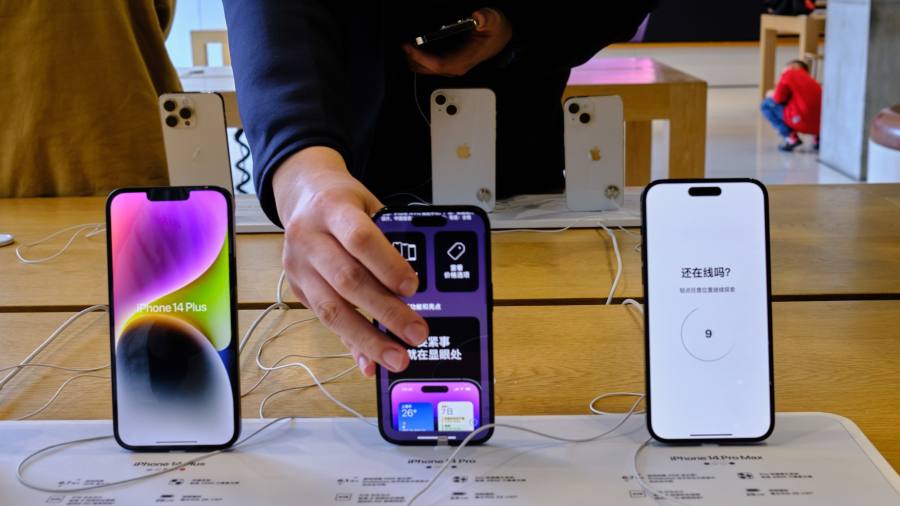Get free Apple Inc updates
We will send you one myFT Daily overview email finalizing the last one Apple inc news every morning.
Investor concerns that China might crack down on government officials’ iPhone use has slashed Apple’s market value by $200 billion, casting a shadow over the launch of its latest smartphone next week.
Beijing’s reported restrictions on government iPhones alongside the resurgent Huawei threaten to derail what should have been a moment of triumph for Apple: dethroning Samsung at the top of the smartphone market.
Before the turmoil in China, analysts had predicted that the launch of the iPhone 15 would put Apple within reach of becoming the largest smartphone maker in the world by volume for the first time.
However, Apple’s shares are down about 6 percent in the past two days as investors worry about Apple’s fate in China, which accounts for about a fifth of its sales.
“Ten years ago it seemed inconceivable that Apple could take the top spot from Samsung, but we may be on the cusp of that milestone,” said Ben Wood, an analyst at CCS Insight. “They will be tantalizingly close, but the Chinese market will play a vital role.”
Several reports have surfaced this week suggesting that Beijing has ordered government officials in certain government departments not to use iPhones or other foreign devices for work.
The Bank of America has estimated that China accounts for 50 million iPhone sales annually and that such a ban could cost Apple 5 to 10 million units a year.
There is no official statement from the Chinese government on this matter yet. Apple declined to comment on a ban, as first reported by The Wall Street Journal.
At the same time, Apple is facing the unexpected return of its biggest rival in China: Huawei.
Last week, China’s “national champion” released a new flagship phone, the Mate 60 Pro, which appears capable of delivering 5G speeds despite Washington-led efforts to hamper Huawei’s ability to source advanced chips.
Washington’s imposition of sanctions on the Chinese telecom group since 2019 had proved devastating. Huawei’s smartphone market share in China fell from 29 percent in mid-2020 to just 7 percent two years later.
However, the Mate 60 Pro – which starts at Rmb 6,999, about $970 – has been flying off the shelves for the past week. Analyst Ming-Chi Kuo of TF International Securities estimated that Huawei could ship up to 6 million units of its latest model by the end of the year, boosting total shipments by 65 percent to 38 million by 2023.
The total smartphone market will shrink for a second consecutive year in 2023 to 1.145 billion units, the lowest in a decade. With competition from Huawei waning, Apple’s global market share has grown from 15 percent to 20 percent over the past decade.
Apple will release four new iPhone 15 models on Tuesday. Improvements to the new model are expected to be incremental, with a move to industry-standard charging ports – a change forced by new Brussels regulations on device manufacturers – among the expected updates.
Nevertheless, Wall Street analysts predict that among the 1.2 billion large customer base, there will be enough iPhone owners willing to upgrade to allow Apple to sell more than 78 million devices in its busy December quarter. That would represent an 8 percent gain from a year ago, when China’s Covid-19 protests disrupted iPhone production.
Analysts at Counterpoint Research predict that, volume wise, Apple might just be enough to outsell Samsung this year. That would earn Apple the global smartphone sales crown for the first time, 16 years after the iPhone went on sale. Both smartphone makers are expected to sell just under 230 million units in 2023, Counterpoint estimates, making the race too close to predict ahead of the unveiling of the new iPhone.
